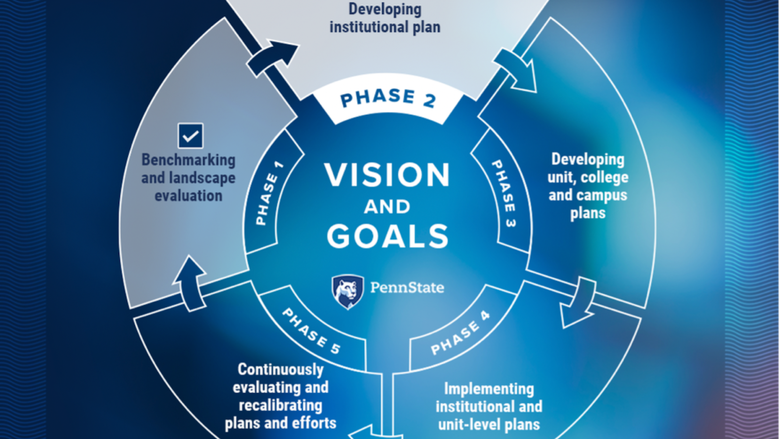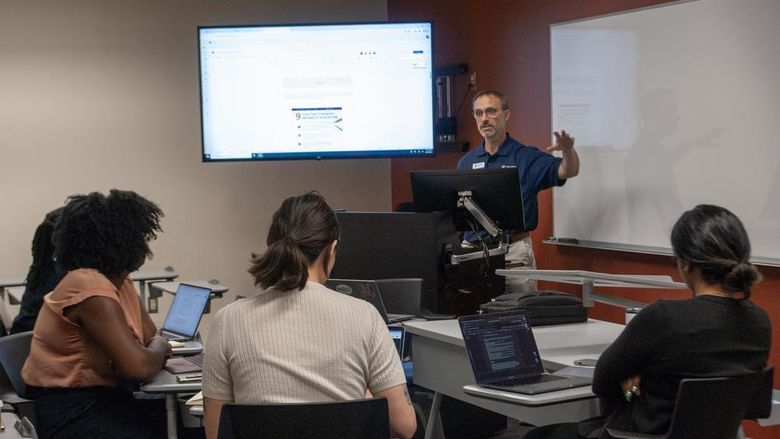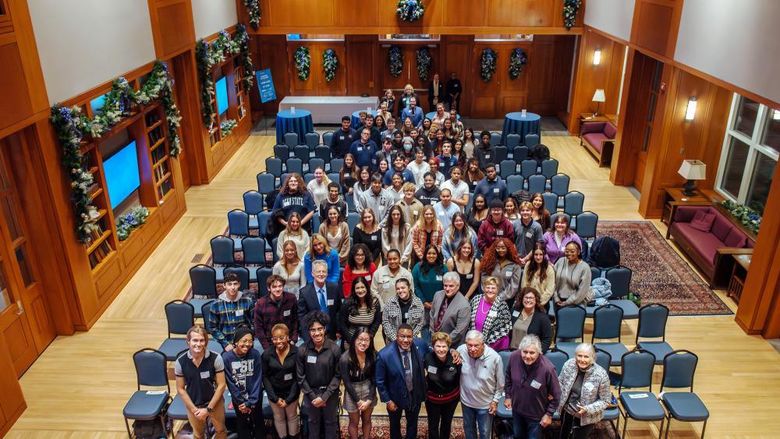To the Penn State community:
I would like to begin by thanking each and every one of you who – in a time of extreme crisis and a time when each day brings uncertainty – came together to focus on what we do best and what we are here to do: carry forward our mission of teaching, research and service to society.
This challenging time has created a global emergency – for our health and safety, our economy and our sense of normal life. The days ahead will be trying, and I fully acknowledge this communication is difficult.
As a result of your fortitude and resilience, I do believe our community will emerge more creative and agile than before and that, with your efforts and support, Penn State will continue to evolve as one of the world’s great institutions of higher education.
This is a very serious financial crisis for the entire country. Our state and national economies have been crippled by the need to enact stay-at-home directives and social distancing. No enterprise is immune to these effects, including Penn State. In Pennsylvania alone, more than 1 million individuals have already filed for unemployment, creating hardship for so many families.
Our projected losses have already exceeded $100 million since March. For our University in the next fiscal year, we estimate an additional $160 million revenue loss — in the education and general funds budget alone. Our planning scenarios take into consideration that Penn State, like other universities, will face reduced enrollment – which impacts tuition revenue. We likely also face a reduced state appropriation, given the negative impact that the pandemic has had on our state tax revenues.
Nevertheless, it is important to emphasize that the University has a strong fiscal and management foundation and is sought after by students in the United States and abroad. We maintain healthy reserves, a strong credit rating and have strong borrowing capacity. All of these aspects will help in our recovery.
Action being taken: Now through June 30
Our strategies are based on detailed analysis and scenario planning to provide adequate time to assess, as much as possible, how our revenue projections are faring, and what stimulus and other supports are available to students, employees and the University in this uncertain and rapidly evolving environment.
As a result of the impacts of COVID-19, some of our employees do not have work they can perform – through no fault of their own. Each employee is important to us, however, we face significant financial losses. In order to support these employees despite the lack of work at this time, the University will continue to pay them 50% of their salary from May 4 to June 30. This includes our Teamsters Local Union No. 8 employees, as the University and their representatives have reached a tentative agreement, which we anticipate finalizing in the near future. We are planning to direct federal stimulus funds received by the University intended for institutional support, separate from student support, to help make this possible.
In addition, these employees will continue to receive their benefits based on the adjusted salary. Based on conversations with the state, we believe that most of these employees should be eligible for unemployment and stimulus support, which may reduce the impact of this salary reduction. Nevertheless, I understand this is a hardship for these employees. Employees paid from sponsored funds shall continue charging salaries, at the reduced rate, to their project budgets in accordance with their current effort distribution. There are too many uncertainties at this time to make workforce projections after June 30, but we will continue to assess circumstances and provide updates regarding whether further steps are necessary.
This action largely affects employees in our auxiliary units and Office of Physical Plant, though other units have employees who face similar circumstances. As many of you know, our auxiliary units have been hit particularly hard. They are self-sustaining units that receive funds generated by our hotels and conference centers, as well as concerts and other events held at the Bryce Jordan Center, for example. Funds also come from fees for room and board. Unfortunately, because of COVID-19, we have had to cancel events; our hotels are empty, as are the majority of our residence halls; and our food services operation has been idled.
Penn State is slated to receive approximately $55 million from the federal Higher Education Emergency Relief Fund as part of $14 billion in support for postsecondary education students and institutions. The funding comes under the recently passed Coronavirus Aid, Relief, and Economic Security (CARES) Act, as announced by the U.S. Department of Education. Of that, half – or nearly $27.5 million – will be directed as noted through CARES, “for emergency financial aid grants to students” at Penn State. The University is working diligently with the Department of Education on next steps and continuing to advocate for further state and federal support.
So, from now through at least the end of the fiscal year (June 30), we do not plan on further furloughs or layoffs. However, we face many uncertainties, and there may still be a need to impose measures like these in the future.
Additional Actions: Fiscal Year July 1, 2020-June 30, 2021
In addition to the abovementioned measures, the University is proceeding with the following actions for the next fiscal year:
- Three Percent Unit Reductions
Over the next two weeks, deans, chancellors and vice presidents and their leadership teams will be working through how to absorb a 3% cut on their education and general fund budgets for fiscal year 2020-2021. These leaders will determine how the budget reduction is achieved, given the types of variances from unit-to-unit that exist, and guidance will be provided. Regardless, this will not be easy. While we will prioritize employees, there may still be some related job impact.
We are a large, complex enterprise and our units are distinct in their structure, thus the effects of these cost-saving measures will not be felt equally. There will be more to share once we have received each unit’s report and can look at the impact broadly and specifically.
- Capital Cost Savings Measures
We also have delayed or deferred several capital projects based on discussions with the Board of Trustees, which will enable us to save nearly $60 million of planned spending. These are all important projects, and more information will be forthcoming on specifics.
- Tuition
As Pennsylvania’s land-grant institution, we recognize the sustained financial hardship this pandemic is placing on Pennsylvania families, and the extraordinary circumstances for families everywhere. In an attempt to mitigate some of the financial hardship and recognizing the special circumstances of this summer session, tuition will be adjusted for the summer semester according to a pre-existing tuition structure and subject to Board of Trustees approval at the scheduled May meeting.
Penn State is one of the leading higher education institutions for online education and because of this we are able to leverage our capabilities and continue to deliver on students’ educational needs and learning outcomes.
Additionally, our plan, also subject to Board of Trustees approval, will not impose tuition increases for the next academic year, again recognizing the challenging current and future circumstances of students and families.
Looking ahead
The University entered this crisis on a solid footing, which will enable us to weather this crisis comparatively well, positioning us to recover – despite the pain.
- Penn State maintains critical reserves, which have helped us withstand past crises like the 2008-2009 recession. These reserves can be used to help manage the deficits we may face over the next few years – particularly if revenue losses exceed our projections in this uncertain environment.
- Penn State was an early adopter of online learning, and we possess one of the most highly ranked programs in the world. Our flexible offerings, which include World Campus, the Commonwealth Campuses and University Park, and “2+2” programs, position us well to attract and retain students. We will be offering support to enable international students for example, to take courses remotely next semester (or longer, if necessary) and, once travel restrictions are lifted, come to a Penn State campus for the remainder of their educational experience.
- In the recent campaign, we have seen record year-over-year fundraising that will continue to play a vital role for the University, as the economy recovers and our alumni and friends help us flourish.
- And, our research enterprise has been on an upward trajectory for several years, generating competitively awarded grants and contracts.
These positive foundations will help us during this crisis, along with other measures as well.
Next steps
It is my intent to schedule a Town Hall in the coming weeks, to share more specifics about the impacts, our implementation plan, and to answer your many questions. As appropriate, you will of course receive further communications from your unit leader or human resources representative.
I want to note especially that our Board of Trustees has been an important partner in providing guidance and support in the development of the action plan I have created, along with the University’s senior management team. We are in lockstep, and that support is important to me and to our ability to navigate this challenge effectively.
In addition, I am also asking the University’s senior leaders to make a voluntary contribution, to be allocated to either the Employee Assistance or Student Assistance funds. I will begin to make monthly contributions of 10% of my salary. Supporting students and employees in need is critically important to both Molly and me, as we know how challenging this time is for many.
Final thoughts
We hope, of course, to return to more normal on-campus operations by the fall, but no one can fully predict what will happen with the pandemic. We have tried to provide some clarity on the current situation for you and we will continue to share updates with our community. You also can visit psu.edu/virusinfo for more information.
It pains me to have had to deliver such hard news, and I know you have many questions. We must be realistic, yet optimistic. It is my hope that this crisis is a short-term shock to our economy and way of life, similar in some ways to a natural disaster. We are a world-class university, with diversified research and educational capabilities, and poised to thrive in our marketplace – both now and in the long-term.
We are Penn Staters. We will pull through this as a community. We always do. And we always will.
Thank you.
Eric J. Barron
President, Penn State





